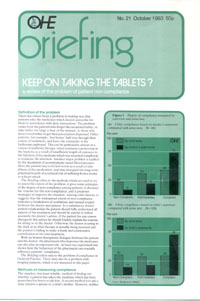Sign up to our newsletter Subscribe
Challenges and Solutions for Budget Impact Analysis of Gene Therapies

There has always been a problem in making sure that patients take the medicines which doctors prescribe for them in accordance with their instructions. The problem varies from the patients who forget the occasional tablet, or take rather too large a dose of…
There has always been a problem in making sure that patients take the medicines which doctors prescribe for them in accordance with their instructions. The problem varies from the patients who forget the occasional tablet, or take rather too large a dose of the mixture, to those who never even bother to get their prescription dispensed. Other patients, for example, ‘feel better’ half-way through their course of treatment, and leave the remainder in the bathroom cupboard. This can be particularly serious in a course of antibiotic therapy, when resistance can develop in the bacteria as a result of insufficient length of exposure to the full dose of the medicine which was intended completely to eradicate the infection. Another major problem is typified by the treatment of asymptomatic raised blood pressure. Here the patient may even feel worse as a result of side-effects of the medication, and may disregard the long-term potential benefit of a reduced risk of suffering from a stroke or a heart attack.
The Briefing refers to the methods which are used to try to assess the extent of the problem; it gives some estimates of the degree of non-compliance among patients; it discusses the reasons for this non-compliance; and it proposes strategies to improve the situation. Among other factors, it suggests that the widespread extent of non-compliance indicates a breakdown of confidence and mutual respect between the doctor and patient. In a satisfactory doctor patient relationship the patient should fully understand all aspects of his treatment and should be careful to follow accurately the doctor’s advice; if the patient for any reason disregards this advice he should frankly explain his reasons for doing so to the doctor. Otherwise the doctor is acting in the dark as to what therapy is actually being received and the patient is failing to make a frank and constructive contribution to his own treatment.
With an honest therapeutic dialogue between the patient and the doctor, the pharmacist who dispenses the medicines can also play an important role. At least one experiment has shown how the behaviour of the pharmacist can crucially influence patients’ compliance. The Briefing refers only to the problem of compliance in General Practice. There may also be a problem with hospital patients, which is not discussed in this paper.
Keep on Taking the Tablets? A Review of the Problem of Patient Non-Compliance
Teeling Snmith, G.
(1983) Keep on Taking the Tablets? A Review of the Problem of Patient Non-Compliance. OHE Briefing. Available from https://www.ohe.org/publications/keep-taking-tablets-review-problem-patient-non-compliance/
Notifications